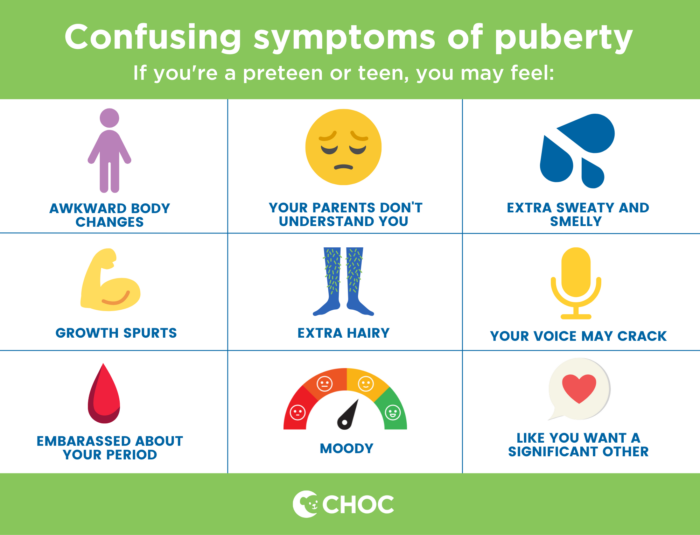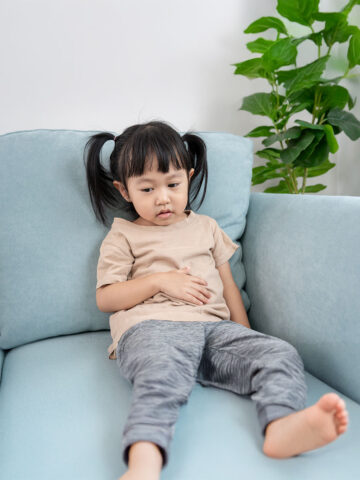How parents can talk to their kids about puberty
Voice changes. Acne. Changing hormones. At some point, every child grows up and enters an unknown territory — adulthood. This stage of life is called puberty, and understandably, your child may have questions about why they look and feel different.
“Normally, if kids ask questions, they don’t need detailed answers,” says Dr. Alexandra Roche, adolescent medicine specialist at CHOC. “Keep it very simple; tell them it’s a normal process.”
Parents should be prepared to provide simple and straightforward answers to questions about what’s happening in both male and female bodies. Kids will be curious about how puberty affects their body along with how it will affect their friends’ bodies. But what’s the best way to talk to children about this new, potentially nerve-wracking life change?
Here, Dr. Roche offers parents an ultimate guide to help parents and teens navigate puberty together.
First off, what exactly is puberty?
Puberty — or sexual development — is the time when kids begin maturing into young adults. They will experience dramatic physical and emotional changes caused by hormones.
Hormones from the brain trigger the onset of puberty, which is the beginning of adolescence, or the developmental stage between puberty and adulthood.
When should I expect my child to go through puberty?
Every child is different, and there’s a wide age range when puberty may begin, says Dr. Roche. Typically, puberty can begin between ages 8 and 13 for girls and ages 9 and 14 for boys.
However, for some kids, puberty may start earlier or later than this range. To ensure your child is developing as expected, be sure to make appointments for annual physicals as your pediatrician should be checking that your child is growing and developing appropriately. If you have any questions or concerns about your child’s puberty, call your pediatrician.
What physical changes should my child expect during puberty?
During puberty, your child may experience dramatic, hormone-driven physical changes. Often, preteens will also experience growth spurts during this time, as well as side effects from hormones like acne and mood changes.
Your child may also experience the following physical changes. Keep in mind that these may not all happen at once, and may happen gradually during puberty:
- Breasts begin to develop, and hips become rounded.
- Pubic hair begins to appear, usually six to 12 months after the start of breast development. About 15% of kids will develop pubic hair before their breast development starts.
- The uterus and vagina, as well as labia and clitoris, increase in size.
- Pubic hair becomes well established, and breasts grow further. Each breast can grow at different rates and may not be the same size.
- Your child may experience an increase in height, weight, body fat and muscle. A growth spurt may occur earlier in puberty for females and later in puberty for males.
- Menstruation begins about two years after breasts start to develop. Most kids will experience a growth spurt one to two years before their period begins and will only grow about one to two more inches after their first period, then growth stops and they have reached their adult height.
- The penis and testicles increase in size. Testicles can grow at different rates and may not be the same size.
- Pubic hair appears, followed by underarm and facial hair.
- The voice deepens and may sometimes crack or break.
- The Adam’s apple, or larynx cartilage, gets bigger.
- Testicles begin to produce sperm. Ejaculation – the release of sperm-containing semen – may also happen.
- Sweat production increases, and body odor may become more noticeable.
What emotional changes should I expect from my child during puberty?
For a lot of kids, these hormone-driven physical changes may cause changes in their mood, too. They may start to behave and interact differently with their family and friends. Baleska Alfaro, licensed marriage and family therapist at CHOC, explains the following emotional changes that your child may experience during puberty.
During this time, you may notice that your child:
- Is interested in romantic relationships and sexuality. This may cause your child to focus more on how they look and dress.
- Withdraws from the family unit to develop autonomy or independence. Your child may start to form their own opinions about religion, politics and the social world around them.
- Is irritable and feels lost. All of the new thoughts and changes that come along with puberty may be confusing for them.
- Draw closer to friends. Your child may start to have a deeper capacity for caring and sharing and want to develop more intimate relationships.
- Become moodier. With hormone-drive fluctuations in mood, your child may have difficulty regulating their emotions.
- Develop the ability to think abstractly. Contrary to their previous tendency as kids to have concrete, structured thoughts, your child may begin to give reasons for their choices, understand consequences and make long-term plans and goals.
It’s important to remember that these are all natural feelings and will take some time to balance out. However, parents and caregivers should also be aware of the differences between natural teen behaviors and depressive behavior.
How does puberty affect mental health?
All of the drastic changes in their bodies, moods, desires and thoughts may be difficult to cope with – for both kids and their parents. It is common for teens to be overwhelmed easily during this developmental period or appear irritated and withdrawn from family because they rather spend time with their friends.
If you’re asking yourself, “Why does my teen hate me?” CHOC experts offer tips and assurance that you are not alone.
When should I call the doctor about my child’s puberty?
All kids go through puberty differently, but you know your child best. There are age-by-age developmental milestones you can look out for, but call your pediatrician if:
- Your child starts to show signs of puberty before age 8 for girls or age 9 for boys.
- Your child has not shown signs of puberty by age 13 for girls or age 14 for boys.
- Your child has not had their menstrual cycle by age 16.
- Your child has not had a menstrual cycle within five years of developing breasts.
How do I talk to talk to my kids about puberty?
It’s important to start talking with your kids about puberty early. Through social media, TV and other kids, children may learn about sex at a young age. However, the information they receive may not be appropriate or reliable. Get ahead of the conversation by giving your child truthful, simple and age-appropriate information that they can understand.
Keep the lines of communication open with your child; “the talk” shouldn’t be a one-time conversation. Explain what’s happening to your child’s body and let them know that what they are feeling is normal. Keep it calm and casual.
Use the following graphic to help your child understand that what is happening to their body is normal.

 Get puberty tips to share with your preteens and teens
Get puberty tips to share with your preteens and teens
Puberty conversation starters
Use the following conversation starter ideas to talk to your kids about puberty:
- “I remember feeling awkward when I was your age. Do you ever feel awkward?”
- Use items around your home like tampons, pads, razors, bras or deodorant as an opportunity to ask your child, “What do you know about these things?” “Do you have any questions?” Make sure to talk to them in an age-appropriate manner.
- If you are watching TV with your child and something about sex or relationships comes up, use it as an opportunity to ask, “Have you ever liked someone?” “How did it feel?” “What have you heard about relationships or sex?”
- Try saying, “You’re growing so much lately!” “How do you feel?” “Do you have any questions?”
- If your child has a presentation at school about puberty, make sure to follow up with them when they get home. Ask questions like, “What did you learn?” “Do you understand what your teacher was talking about?” “Do you have any additional questions?”
- “If you ever have any questions about anything, you know you can ask me.”
How to answer your preteen and teens’ frequently asked puberty questions
The first outward signs of puberty typically start with the testicle or breast development. Testicles will start to get bigger, and curly hair may sprout just about the penis and on the scrotum.
Breast development usually starts with small, firm, tender lumps (called buds) under one or both nipples. They will then get larger over the next couple of years.
Yes, hormonal shifts may cause a couple of changes to your hair:
1. Hair Texture: Hormonal shifts can affect the texture of your hair. It might become curlier, straighter, frizzier or smoother.
2. Oiliness: During puberty, the production of sebum (the natural oil that keeps your scalp and hair moisturized) increases. This can result in oilier hair and sometimes contribute to scalp acne.
Typically, these changes are temporary! As your hormones stabilize post-puberty, your hair will likely return to its previous state.
Hormones during puberty may take a while to balance out. Everyone is different, so there’s no specific time frame for hormonal stabilization. However, generally by the end of adolescence — or your late teens or early twenties — your hormones should balance out.
If you have any concerns about your hormone levels or notice any unusual symptoms, have your parents call your pediatrician.
Yes. For many people, acne tends to improve or often goes away after puberty. During puberty, hormonal changes can lead to an increase in oil production, clogged pores and the growth of acne-causing bacteria, resulting in pimples and acne breakouts. However, once most people reach adolescence and their hormones begin to stabilize, their acne may become less severe.
To help control breakouts, get an ultimate guide to acne prevention and treatment from CHOC.
Yes, body odor is a common sign of puberty. During puberty, your body undergoes various changes, including an increase in the production of sweat and the activity of the sweat glands. As a result, body odor can become more noticeable.
To manage body odor during puberty, make sure to practice good hygiene and focus on areas prone to sweat and odor. Using antiperspirants or deodorants can also help.
For more health and wellness resources from the pediatric experts at CHOC, sign up for the Kids Health newsletter.
Find a CHOC Primary Care Pediatrician
From babies to teens, pediatricians from CHOC’s Primary Care Network partner with parents to offer immunizations, sick visits, sports physicals and more.






